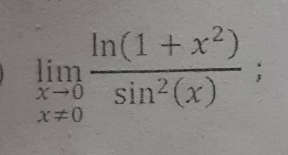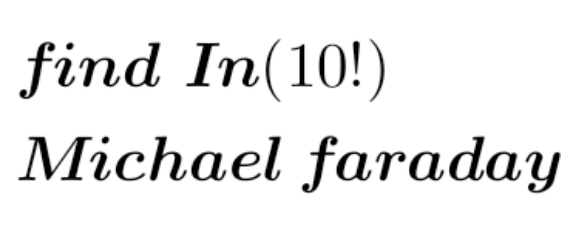
|
|

|
All Questions Topic List |
LimitsQuestion and Answers: Page 5 |
Question Number 204900 Answers: 0 Comments: 2
|
| lim_(n→∞) n!(e−x_n ) = ?
where x_(n ) = 1+(1/(1!))+(1/(2!))+...+(1/(n!))
|
|
Question Number 204879 Answers: 2 Comments: 2
|
| lim_(n→∞) n!(e−x_n ) = ?
where x_(n ) = 1+(1/(1!))+(1/(2!))+...+(1/(n!))
|
|
Question Number 204574 Answers: 2 Comments: 0
|
|
lim_(n→∞) n^(−3/2) [(n+1)^((n+1)) (n+2)^((n+2)) ...(2n)^(2n) ]^(1/n^2 ) = ?
|
|
Question Number 204558 Answers: 0 Comments: 0
|
| lim_(n→∞) n^(−3/2) [(n+1)^((n+1)) (n+2)^((n+2)) ...(2n)^(2n) ]^(1/n^2 ) = ?
|
|
Question Number 204477 Answers: 1 Comments: 0
|
| lim_(n→∞) (2n∫_0 ^1 (x^n /(1+x^2 ))dx)^n =?
|
|
Question Number 204396 Answers: 1 Comments: 0
|

|
Question Number 204395 Answers: 1 Comments: 0
|

|
Question Number 203980 Answers: 3 Comments: 0
|
| lim_(x→2) ((ax^2 +bx+6)/(x^2 −x−2))=10 ; find a=? ∧ b=?
|
|
Question Number 203508 Answers: 1 Comments: 0
|
| Evaluate the given limit:
lim_(n→∞) (((8)^(1/n) −1)/( ((16))^(1/n) −1))
|
|
Question Number 203330 Answers: 2 Comments: 0
|

|
Question Number 203247 Answers: 2 Comments: 0
|
| lim_(x→0) x tan(π/2)(1+x)=?
|
|
Question Number 203180 Answers: 1 Comments: 0
|

|
Question Number 203059 Answers: 0 Comments: 1
|

|
Question Number 202530 Answers: 1 Comments: 0
|

|
Question Number 203668 Answers: 1 Comments: 0
|

|
Question Number 202249 Answers: 0 Comments: 0
|
| C = lim_(x→0) ((x ((cos x))^(1/3) − sin x)/x^5 ) =?
|
|
Question Number 202161 Answers: 2 Comments: 0
|

|
Question Number 202160 Answers: 1 Comments: 0
|

|
Question Number 201877 Answers: 0 Comments: 0
|

|
Question Number 201724 Answers: 0 Comments: 0
|
| lim_(x→0) ((e^x (x−2)+x+2)/x^3 ) solve it by not using
taylor series or l′hopital rule.
|
|
Question Number 201680 Answers: 1 Comments: 0
|
| ⋐
|
|
Question Number 201657 Answers: 1 Comments: 0
|
| if f(x)= { ((((sin (1+[x]))/([x])) for [x]≠0)),((0 for [x]=0)) :}
where [x] represents an integer x greatest ≤ x
Find lim_(x→0^− ) f(x).
|
|
Question Number 201221 Answers: 2 Comments: 0
|

|
Question Number 201108 Answers: 0 Comments: 6
|

|
Question Number 200884 Answers: 0 Comments: 0
|

|
Question Number 200821 Answers: 1 Comments: 0
|

|
Pg 1
Pg 2
Pg 3
Pg 4
Pg 5
Pg 6
Pg 7
Pg 8
Pg 9
Pg 10
|
Terms of Service |
Privacy Policy |
Contact: info@tinkutara.com |




























